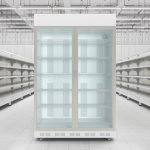 8 Most Common Commercial Refrigerator Repair Issues
8 Most Common Commercial Refrigerator Repair Issues
When running a commercial kitchen, it is essential to have proper refrigeration. A malfunctioning refrigerator can lead to spoiled food, health hazards, and unhappy customers. Knowing the most common issues with commercial refrigeration can help you identify problems early and prevent them from becoming bigger, more expensive problems. Here are the 8 most common commercial refrigerator repair issues:
1. Refrigerator not cooling enough
The most common complaint regarding commercial refrigeration is that it isn’t cooling enough. Several parts can cause this issue, including the fan, compressor, condenser coils, and evaporator coils. If the fan isn’t working, cold air won’t circulate properly. This can be due to a broken motor, belt, or worn bearings. Compressor issues can also be the cause of the refrigerator not cooling enough. If the compressor doesn’t turn on or is running too hot, it can’t cool the air properly. Dirty condenser coils can also impact cooling performance. If the coils are clogged with dirt or debris, the compressor will have to work harder to cool the air.
2. Refrigerator not turning on
If the refrigerator doesn’t turn on at all, it is likely a problem with the power supply. Check the electrical outlet to ensure it is working and that the refrigerator is plugged in properly. If it is, then the issue may be a damaged power cord or a malfunctioning thermostat. A technician will need to replace the broken parts to get the fridge operational.
3. The refrigeration unit is making strange noises
A commercial refrigerator should operate smoothly and quietly. If you hear strange noises like hissing, buzzing, or knocking, it’s a sign of a problem. A buzzing noise typically indicates an issue with the compressor. A hissing noise could mean either a refrigerant leak or a clogged capillary tube. The knocking sound may arise from a faulty fan motor or worn bearings.
4. Refrigerant leaks
Leaks allow refrigerants to escape and become ineffective, rendering the refrigerator useless. Refrigerant leaks require an expert technician to identify the location of the leak and make necessary repairs on the spot.
5. Condenser coils freeze up
If the condenser coils ice up, it is due to a failure in the defrost cycle. Defrost problems commonly occur when faulty defrost timers or defrost heaters break down and need replacement.
6. Evaporator fan issues
A malfunctioning evaporator fan is another problem that makes the refrigerator less efficient. If the evaporator fan doesn’t turn on regularly, its motor could be damaged, or the blades may become clogged by frost buildup. The refrigerator needs a professional diagnosis and fix to restore optimal operation.
7. Frost buildup on evaporator coils
Cold, damp conditions cause frost formation on the evaporator coils. If the defrost system fails or the door gasket leaks, this issue exacerbates. Ice accumulation on the coils reduces the refrigerator’s cooling ability and can cause the compressor to work much harder to maintain adequate temperature levels.
8. Door seal problems
The door seal of the refrigerator is vital for maintaining proper temperature levels inside the unit. The seal prevents cold air from escaping and warm air from entering, keeping food at safe temperatures. If the seal is worn out or damaged, the air can leak through gaps, making the compressor work too hard. In addition, a faulty seal can cause frost buildup along the door’s perimeter, which can eventually damage the door’s plastic lining.
Final Thoughts
The takeaway message here is that diagnosing and repairing commercial refrigeration issues must be left to qualified professionals with years of experience. You shouldn’t attempt to fix them on your own, as a little mistake can make the problem worse or cause major damage to internal components. If you are experiencing any refrigerator problems, contact a licensed technician to inspect your system and find a lasting solution. Remember to schedule regular maintenance services to keep your commercial refrigerator working efficiently and effectively.

 8 Most Common Commercial Refrigerator Repair Issues
8 Most Common Commercial Refrigerator Repair Issues